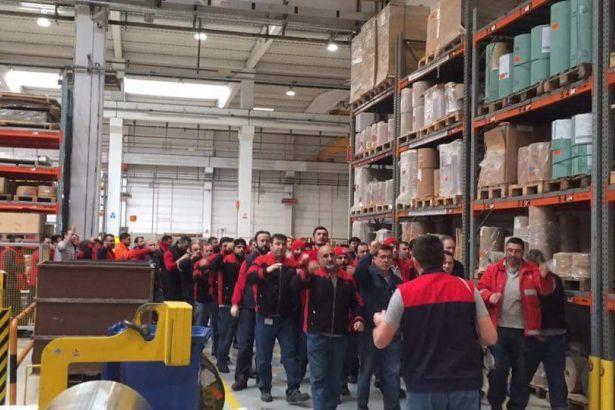Government bans workers’ strike in metal sector

The ruling Justice and Development Party has banned a strike in Turkey’s metal sector, citing national security. The government continues its anti-working class policies.
While the metalworkers are preparing for the strike in many factories, the first step will be taken today at Asil steel factory. The decision of a Cabinet of Ministers, signed by President Recep Tayyip Erdoğan, is published in the Official Gazette.
“The strike by Birleşik Metal-İş in Asil Steel Company listed has been considered to be damaging national security,” read a cabinet decision published in the Official Gazette.
Strike decision is taken by the majority of workers in each of the enterprises. The workers are organized by BMİS (United Metalworkers’ Union), affiliated to DİSK (Confederation of Progressive Trade Unions of Turkey).
BMİS: EMPLOYERS ENDANGER NATIONAL SECURITY
President of BMİS Adnan Serdaroğlu talked to soL about the strikes in metal sector and the ban by the government. Serdaroğlu said that the government banned metal sector strikes illegally in 2015, too. He underlined that the employers' and the government are damaging national security by ignoring demands of workers and that employers' do not answer these demands because they take the support of the government for granted.
Serdaroğlu mentioned that the decision by the Council of Ministers is published the Official Gazette, so, workers of the Asil Steel Factory are returned to their works, but the working environment is not peaceful. The trade union will continue its negotiations with the employer and then return to the workers for their decision.
HOW THE RIGHT OF STRIKE IS SEIZED?
The constitution of Turkey gives the government the right to ban and delay the strikes. According to the constitution, the conditions and working places where the right to strike can be banned or delayed are said to be determined in a related law. It is also written in the constitution that if a strike is banned or delayed, the disagreement between employer and employees is solved by High Board of Arbitration, whose decision on the disagreement is final. The cabinet was given the right to ban and delay strikes with a law approved in the aftermath of the Sept. 12, 1980, military coup d’état.
In the law on trade unions and collective bargaining agreements, strikes are banned in several sectors, including energy, transportation, and health-care sectors. It is also written in the law that strikes in the determined sectors can be delayed for 60 days if the Council of Ministers decides that this strike is endangering social health or national security. After the attempt of coup d'état on July 15, a statutory decree is published and the strikes that "endanger urban transportation or economic or financial stability" are included in the strikes to be delayed by Council of Ministers.




